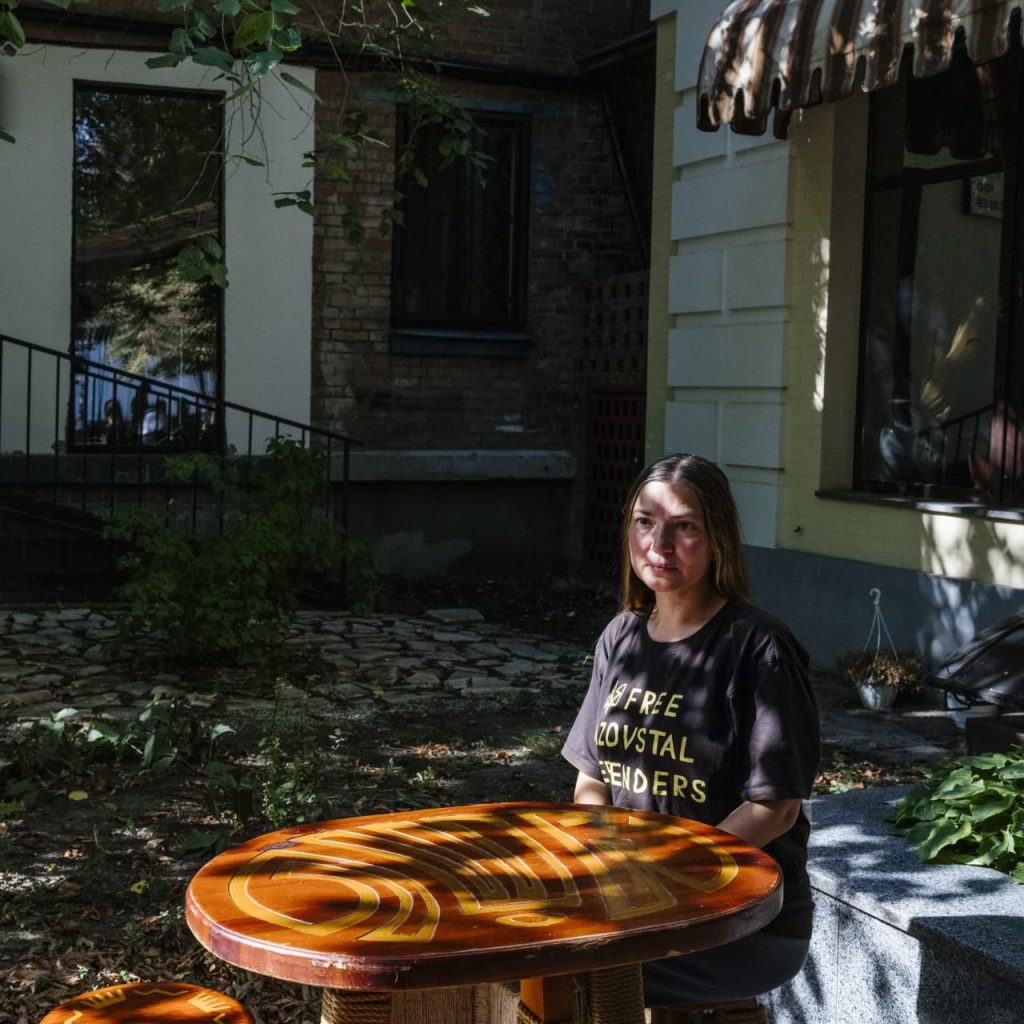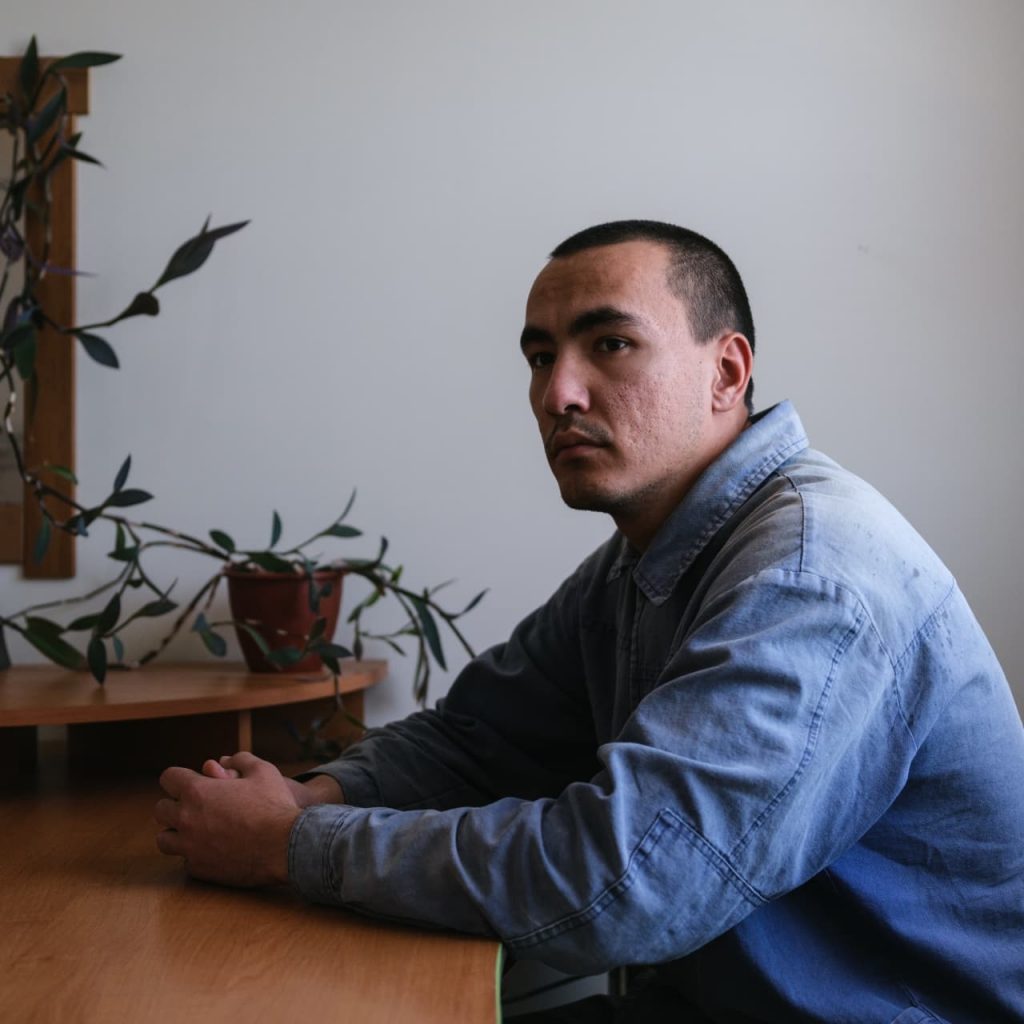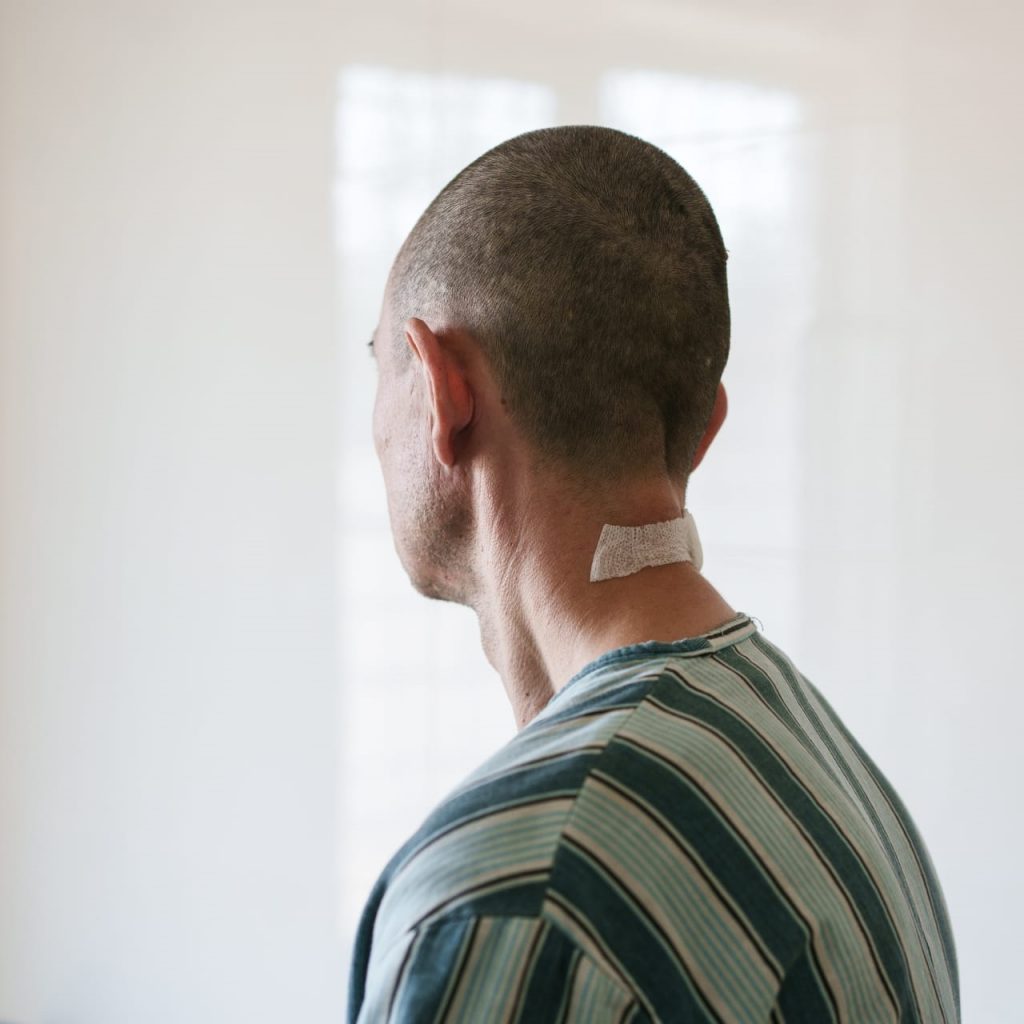KYIV, Ukraine—For much of the 2½ years that Ukrainian soldier Artem Vyshniak has been held by Russia, his mother, Tetiana, has sat in protest for 10 hours a day outside a Ukrainian government building with the wives and mothers of other captive Ukrainian troops.
In another part of Ukraine, Senior Sgt. Sergei Galkin has spent that time languishing in a detention center for Russian prisoners of war, the only still-captive member of an eight-person unit that crossed into Ukraine in the first days of the invasion.
“I’m stuck in the gray zone,” the 37-year-old father of two said, sitting in an ill-fitting blue prison uniform in one of the facility’s spartan dormitories. “You live each day waiting for some answer to come.”

Tetiana Vyshniak Photo: Emanuele Satolli for WSJ
The limbo that Galkin and Vyshniak find themselves in is the result of a protracted standoff between the two countries over the fate of their soldiers as the war grinds through its third year . Russia holds an estimated 8,000 Ukrainian soldiers, while Ukraine is believed to have up to 5,000 Russians waiting to be returned to their homeland. The countries don’t release official figures.
Kyiv faces a host of challenges as it tries to fend off Russian forces that have been steadily advancing on its eastern front for months. The country is short on manpower to defend its front lines and faces a grueling winter ahead with Russia taking aim at its energy infrastructure . But bringing prisoners of war home has become one of Ukraine’s most intractable problems—and a pressure point Russia has sought to exploit.
While Kyiv and Moscow have conducted prisoner exchanges periodically throughout the conflict and the countries’ human-rights envoys meet regularly to discuss exchanges, thousands are still waiting to return home—some since the earliest days of the war. Ukraine is now resorting to all kinds of schemes to get its soldiers back—even offering up its own citizens accused of collaborating with Russia, and the bones of a Soviet-era spy buried in western Ukraine.
Kyiv says Moscow is stalling and using the prisoners to put pressure on President Volodymyr Zelensky when polls show Ukrainians are tired of the war and in favor of a peace deal. The wives and mothers of Ukrainian soldiers hold demonstrations regularly in Kyiv.
“It makes no difference to the Russians if their soldiers are captive. They have no social unrest to deal with,” said Mykhailo Podolyak , a senior adviser to Zelensky. “We have relatives constantly on our streets, talking, publishing information, and pressuring government institutions.”
Russia has said, without giving details, that Ukraine is setting unrealistic conditions for swaps and that Moscow is doing everything it can to get its soldiers home. The Russian official responsible for coordinating prisoner swaps didn’t respond to a request for comment.
POWs and rights groups have detailed systematic torture in Russian prisons. In July, a soldier died in Russian captivity from a “closed chest injury caused by a blunt object,” according to an autopsy conducted in Ukraine. Russia denies that it mistreats Ukrainian prisoners.
Kyiv accuses Moscow of trying to sow discontent among relatives of Ukrainian POWs. Some have complained of calls from Russian phone numbers, urging them to organize street protests. Russian television has also broadcast reports in which emaciated Ukrainian prisoners complain that their government doesn’t want them back.
“The Zelensky regime is in no rush to bring them home,” Russia’s main news anchor Dmitry Kiselyov said on his flagship current affairs show in June.
More than 1,000 soldiers from each side have been exchanged this year. A swap in October—mediated by the United Arab Emirates—freed almost 200 Ukrainian and Russian soldiers. But the exchanges haven’t been enough to stop the number of POWs on both sides from growing. Ukraine opened three new POW detention centers in 2023 and a fifth was created this year, because all the others were already full. Ukraine doesn’t publicly disclose the locations of the facilities.
Ukraine has broadened its efforts to get soldiers back, proposing exchanging Ukrainians convicted of working with Moscow for Ukrainian soldiers and civilians held in Russia. Hundreds of Ukrainians are serving sentences on collaboration charges in a special jail 12 miles from the eastern front line. Kyiv says dozens of them have signed documents saying they are willing to be taken to Russia, but only one person has been swapped this way so far.
Even the bones of long-buried Russian spies are being used by Kyiv as a bargaining chip. For instance, Moscow has repeatedly demanded that Ukraine return to Russia the remains of Nikolai Kuznetsov, an intelligence agent who spied for the Soviets in Nazi-occupied western Ukraine and is reputed to have killed 11 of Hitler’s top officials in the region, then a part of the U.S.S.R. The mayor of Lviv, where Kuznetsov is buried, has said Russia will only get the spy back if it agrees to trade Ukrainians in return.
In the largest POW detention center in Ukraine, the one Galkin is held at, the Russians spend their days toiling at various workshops producing furniture for sale at Ukrainian stores and souvenir tote bags with slogans such as “I love Lviv.” Many of the Russians there have spent more than a year waiting to go home.

Ruslan Abilov Photo: Serhii Korovainyi for WSJ
“Russia doesn’t need us,” said 24-year-old Ruslan Abilov, who surrendered to Ukrainian troops in October 2022 after five days on the front line. He said he was twice taken to northern Ukraine for inclusion in an exchange, and twice brought back.
“If they wanted us to go back, they would get us back,” Grigory Zuyenko, a 32-year-old soldier who has been held since June 2023, said of the Russian side. The Wall Street Journal was allowed to speak to Russian POWs in a separate room away from Ukrainian guards. Among the servicemen at the POW camp are dozens of wounded men.
For Galkin, captivity began not long after he entered Ukraine on the first day of Russia’s invasion in February 2022, leading a seven-person squad manning an infantry fighting vehicle trailing a vast column of Russian armor. A vehicle ahead broke down and Galkin’s squad stayed behind to help. After they began moving again, they were ambushed by troops from Ukraine’s territorial defense and forced to surrender.
Back at his home in Russia’s Samara region, Galkin’s wife contacted his base commander and the Russian Defense Ministry. He was registered as a prisoner of war, committing the Russian side to seeking his release. But while the other members of his unit were swapped two years ago, he has been left behind.
In Ukraine, Tetiana Vyshniak last heard from her son, Artem, the day before he and thousands of other members of Ukraine’s Azov battalion surrendered to Russian troops inside the Azovstal steel plant that was their last bastion in the eastern city of Mariupol.
A man identified as Artem Vyshniak appeared in a March video posted by the Investigative Committee, Russia’s version of the FBI, reciting an apparently memorized text about war crimes. He was put on trial and sentenced to prison time for resisting the Russians.

Grigory Zuyenko Photo: Serhii Korovayny for WSJ
In desperation, Vyshniak has participated in rallies organized by wives and mothers of Azov soldiers in Kyiv, to draw attention to their plight. She has appeared in music videos dedicated to POWs and given TV interviews.
“We want to remind other Ukrainians, and the whole world, that our people are still in captivity,” she said.
In Russia, relatives of POWs held in Ukraine have lodged countless appeals to the office of President Vladimir Putin , the Defense Ministry and the Kremlin’s human-rights council.
“They tell me Ukraine is preventing his return home,” said the mother of a 21-year-old Russian POW interviewed by the Journal in Ukraine, who has been held since June 2023.
For the Russians, staying captive in Ukraine might be safer than returning. POWs who go home in swaps are questioned by Russia’s security services, their past statements scrutinized. Dozens have publicly denounced Putin’s government in interviews with popular Ukrainian bloggers, who push them to take a side in videos that go viral online.
A week after his capture, Galkin appeared at a press conference in Kyiv with the other men from his unit. He looked agitated as he called on fellow Russians to put down their arms and denounced his country’s military command.
“I ask forgiveness from every home, every street, every citizen of Ukraine, women, children, the elderly, for the fact that we invaded this land,” he said.
Galkin says going home to his wife and two small children, regardless of the risk, is preferable to the limbo he has been in for almost three years.
“There’s so much hopelessness in this situation that you think you’d rather die than remain here,” he said. “Obviously you try to banish such thoughts, but they don’t go away.”
Write to Matthew Luxmoore at matthew.luxmoore@wsj.com


